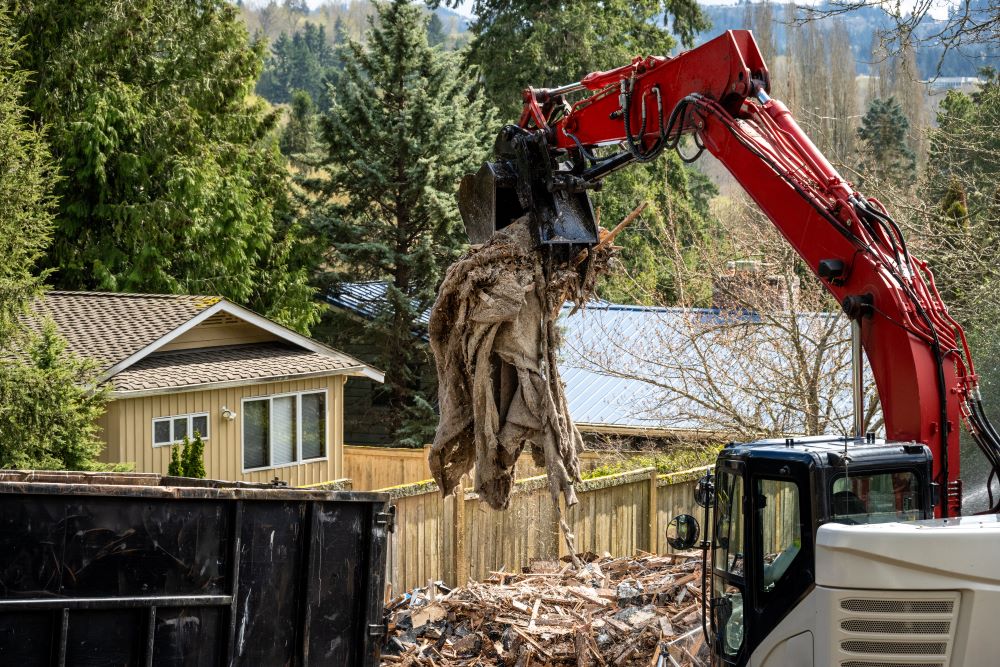
How a Residential Demolition Company Plans a Safe Demolition
Residential demolition is a difficult procedure that has to be carefully planned and carried out to protect all parties. Given the high hazards involved with demolition operations, safety should always be the company’s first concern. Hazardous chemicals and structural instabilities are only two of the many possible threats that need to be properly controlled to avoid mishaps and injuries.
Here at Maxton Demo, we recognize how crucial safety is while demolishing homes. Our staff receives extensive training on how to recognize and successfully manage risks. We safeguard the environment and the community, in addition to our personnel, by putting safety first at every step of the demolition process.
OUR SERVICES
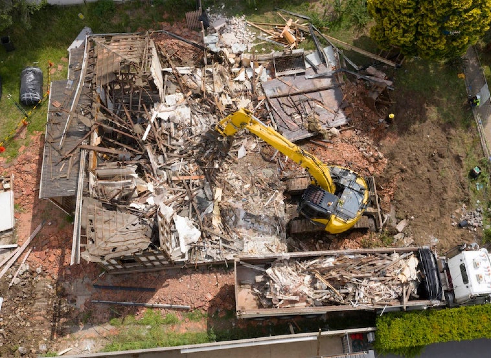
Structure Demolition. Residential, Commercial & Industrial
If your structure poses a health, safety, or environmental risk, demolition can prevent costly citations or fatal accidents. While this may seem daunting, you are just a phone call away from having your residential demolition done professionally, responsibly, and at a great price.
Talk to a Demolition Specialist Now! 916.249.5001
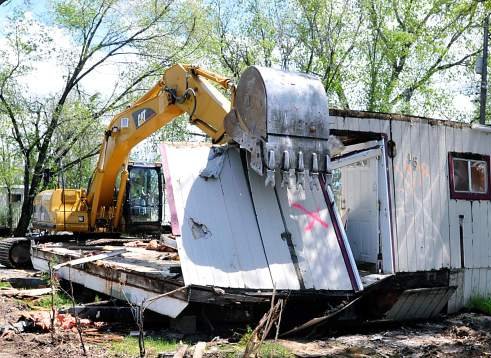
Mobile Home Demolition
We demolish and haul away mobile homes. Any size, anywhere, anyhow. We are fast, clean and competitive. We serve most of Northern California. There are many factors to consider when removing or demolishing your old trailer, mobile home, or manufactured home like: the processes involved, costs, time, contractors, debris, and permits.
Talk to a Demolition Specialist Now! 916.249.5001
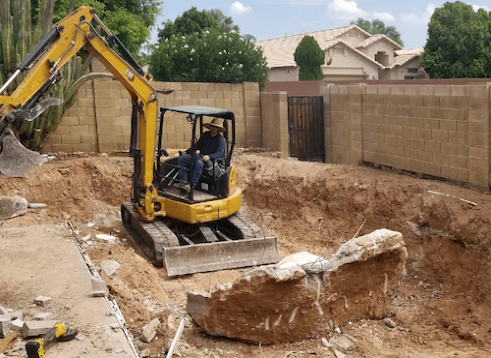
Pool Demolition
When removing a pool in Sacramento, California with the professional demolition team of Maxton Demo, you’re guaranteed peace of mind from beginning to end. From your initial request for an estimate to clean-up, you can expect our pool demolition process that’s completely professional and safe.
Talk to a Demolition Specialist Now! 916.249.5001
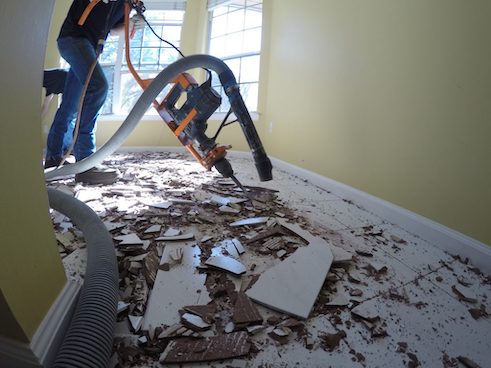
Floor Demolition
Flooring demolition, like any other major home renovation work, requires a specific set of skills and tools to be performed properly. You need experts in flooring demolition to get you the best floors possible. Contact us to find out more about how we can help you today.
Talk to a Demolition Specialist Now! 916.249.5001
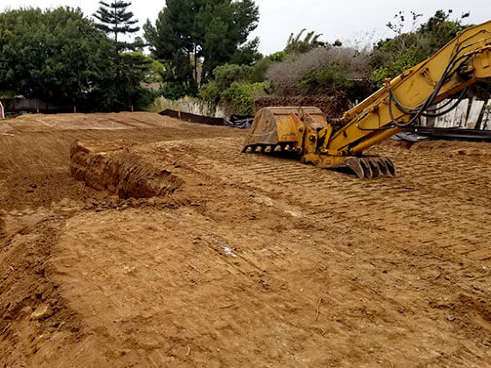
Grading & Excavating
If you need an experienced excavator and grader in Sacramento, call us today. One of the many reasons that residential, commercial, and industrial customers choose to work with us is because we’re able to provide a broad range of services to help construction-related projects get done in less time and at a reduced cost.
Talk to a Demolition Specialist Now! 916.249.5001

Roof Snow Removal
Heavy snow & ice dams can cause significant roof and home damage. Roof Snow removal is our specialty during the winter months. Serving the Sacramento, California area for 10 years, we can get your roof snow removed and promise a quick response and reasonable rates.
Talk to a Demolition Specialist Now! 916.249.5001
Recognizing the Rules and Permits Concerning Residential Demolition
It is important to have a thorough grasp of the laws and permissions governing home demolition projects before starting one. Numerous municipal, state, and federal regulations aimed at protecting the environment and public safety apply to demolition projects. There may be penalties, delays, and even legal repercussions for breaking these rules.
At Maxton Demo, we collaborate closely with regulatory bodies to get the required permissions for our projects since we take compliance very seriously. By keeping up with the most recent rules and specifications, we make sure that our demolition operations are completed in compliance with all applicable laws. In addition to safeguarding our reputation, our adherence to compliance shows how committed we are to maintaining the highest levels of professionalism and safety.
We clarify the legal framework governing home demolition projects by exploring the intricate world of permits and rules. Planning a demolition involves taking a lot of things into account, such as environmental impact studies and zoning regulations. We can reduce the possibility of problems and expedite the procedure by skillfully negotiating these laws.
Getting Ready for a Secure Home Demolition Project
Careful planning is essential for a home demolition project to be successful. It is essential to create a comprehensive strategy that covers every facet of the project, from trash disposal techniques to safety procedures, before any demolition work starts. Demolition firms may reduce hazards and guarantee a seamless and effective procedure by allocating sufficient time for preparation.
Every demolition job we take on at Maxton Demo is approached with painstaking attention to detail. To find any risks, our team thoroughly evaluates the site and creates a demolition strategy that puts safety first. We provide a strong basis for a demolition project’s success by foreseeing problems and coming up with practical solutions.
By highlighting the significance of planning in home demolition, we highlight the vital role that preparation plays in guaranteeing efficiency and safety. Every step of the planning process, from setting up efficient lines of communication to organizing logistics, adds to the project’s ultimate success. Demolition firms may position themselves for success by putting time and money into planning.
Tools and Equipment for Residential Demolition
For residential demolition operations to be completed safely and effectively, a variety of specialized tools and equipment are needed. The machinery used in demolition, which ranges from jackhammers and concrete crushers to excavators and bulldozers, is essential to the project’s success. High-quality equipment and gear are investments that demolition firms may make to increase efficiency and safety on the work site.
Modern tools and equipment are used by Maxton Demo to guarantee the efficient completion of our demolition operations. Because of our team’s training in safe use of this equipment, we can operate quickly without sacrificing the greatest safety requirements. Our equipment is routinely inspected and maintained to reduce the possibility of malfunctions and accidents occurring while the demolition is underway.
We shed light on the technical developments that propel the home demolition sector by exploring the realm of tools and equipment. There are a lot of improvements that improve safety and efficiency in demolition operations, such as dust suppression devices and robotic demolition systems. Demolition businesses may remain ahead of the curve and provide excellent results by keeping up with the newest advancements.
Environmental aspects of waste management
Environmental concerns and waste management are essential components of every home demolition project. Large volumes of garbage are produced during demolition operations, including metals, concrete, and other items that need to be disposed of properly. Demolition businesses may exhibit their dedication to sustainability and corporate responsibility by putting into practice efficient waste management procedures and limiting their impact on the environment.
Environmental sustainability is a top priority for Maxton Demo when it comes to demolition projects. We collaborate closely with waste management companies and recycling centers to make sure that items are disposed of in an environmentally responsible way. When feasible, we recycle and repurpose resources to lessen the environmental impact of our work and help create a more sustainable future.
Through an examination of the significance of waste management and environmental factors in residential demolition, we highlight the need for ethical standards in the sector. Demolition businesses may reduce their environmental impact in a number of ways, from asbestos removal to soil treatment. We can save natural resources and advance a cleaner, greener future by implementing best practices and welcoming creative ideas.
Making Sure the Demolition Team Has Safe Working Conditions
In each home demolition job, the safety and welfare of the demolition crew come first. Working in demolition is dangerous by nature; potential dangers include exposure to poisonous materials and structural failures. Demolition businesses may provide a safe working environment that keeps workers safe by offering thorough training, protective gear, and monitoring.
We go above and beyond at Maxton Demo to make sure that our team members are secure. To be informed about the newest procedures and industry best practices, our staff regularly participates in safety training. To reduce dangers on the work site, we supply personal protective equipment and strictly follow safety regulations. By cultivating a culture of safety and responsibility, we enable our staff to work confidently and stress-free.
We draw attention to the human aspect of home demolition projects by highlighting the significance of safe working conditions for the demolition crew. Every successful demolition is the result of a group of committed experts who put in endless effort to guarantee a quick and safe procedure. By making investments in our workers’ well-being, we not only safeguard their physical health but also foster a supportive and effective work environment.
The Residential Demolition Company’s Blueprint: The Significance of Strategic Planning
Strategic planning is clearly the key to a demolition company’s success and longevity in the ever-changing world of residential demolition. Strategic planning is more than just a formality; it is the compass that guides an organization toward its objectives, aids in overcoming obstacles, and makes the most of opportunities. A residential demolition firm positions itself for long-term development and quality by establishing a solid strategic basis.
A residential demolition firm may detect possible dangers, foresee market trends, and build on its strengths through strategic planning. It offers a road map for goal-setting, resource allocation, and decision-making, guaranteeing that every move is in line with the organization’s overall goals. In a competitive industry where accuracy and efficiency are critical, strategic planning is the foundation for success.
A well-written strategic plan gives the company direction and a sense of purpose, in addition to outlining the actions to be performed. It promotes cooperation and synergy by directing the efforts of all parties involved—from management to employees working on-site—in the direction of a single goal. A residential demolition firm may confidently take advantage of new possibilities, reduce risks, and adjust to changing conditions by cultivating a culture of strategic thinking.
Important Components of a Residential Demolition Company’s Strategic Plan
The meticulous integration of essential components that complement each other and propel the business toward its goals is what makes a home demolition company’s strategy plan successful. Strategic planning is based on market studies, which offer insights into consumer preferences, industry trends, and the competitive environment. A demolition firm may adjust its strategy to suit changing needs and remain ahead of the curve by having a thorough awareness of market dynamics.
Allocating resources is another crucial component of a strategic plan, as it dictates how well the organization uses its resources to accomplish its objectives. Strategic allocation means ensuring that resources—whether they be financial, human, or mechanical—are used effectively, maximizing output, and reducing waste. A residential demolition firm may increase operating efficiency and profitability by strategically allocating resources.
Strategic planning must include risk assessment in order for a demolition firm to recognize possible dangers and create mitigation plans. Through the implementation of a comprehensive risk analysis, the organization may anticipate problems, avert setbacks, and preserve its standing. The goal of risk management is to properly manage risks in order to reduce their influence on the performance and profitability of the organization, rather than completely eliminate them.
Establishing Targets and Goals for the Strategic Plan of a Residential Demolition Company
A home demolition firm uses goals and objectives as a compass to help it achieve its targeted results. Establishing quantifiable objectives is essential for defining achievement, monitoring advancement, and guaranteeing responsibility. In contrast, objectives deconstruct goals into concrete, doable stages that must be followed in order to accomplish them. A demolition firm may design a plan that produces observable outcomes by establishing SMART objectives, which stand for specified, measurable, attainable, relevant, and time-bound projects.
A residential demolition company’s aims and objectives should be in line with its purpose, vision, and values. These fundamental components provide the business with direction and a sense of purpose, directing its strategic choices and activities.
Through fostering a culture of alignment and commitment among its stakeholders, a demolition firm may ensure that its aims are in line with its basic values and ambitions. To keep everyone in the company motivated and engaged, it is imperative that goals and objectives be communicated clearly. This will help everyone understand their part in accomplishing the goals.
A home demolition firm should define short-term goals that act as checkpoints along the process in addition to long-term objectives. These short-term goals divide the overall goals into achievable tasks and provide the organization with incremental benchmarks to strive toward.
A demolition firm may sustain momentum, create a feeling of accomplishment, and raise morale by acknowledging and applauding modest triumphs and progress toward goals. In order to adjust to changing market circumstances, internal dynamics, and external influences that might affect the company’s strategic direction, goals and objectives must be reviewed and revised on a regular basis.
Creating Plans and Approaches for the Strategic Plan of a Residential Demolition Company
The foundation of a residential demolition company’s strategic plan consists of strategies and tactics, which convert goals and objectives into workable plans that produce outcomes. A company’s strategy is a high-level plan outlining how it plans to achieve its objectives; tactics are the particular steps necessary to carry out the strategy in an efficient manner. A demolition firm may coordinate its resources, skills, and actions toward a shared goal by creating plans and tactics that are distinct and well-thought-out.
A residential demolition company’s competitive positioning, market dynamics, and internal strengths and weaknesses must all be taken into account while creating strategies. The company’s strategies must make use of its USPs to set it apart from rivals and take advantage of market possibilities.
Whether a firm wants to grow into new areas, embrace breakthrough technology, or concentrate on sustainable practices, its strategy should be matched with its long-term goals and customized to play to its strengths. A demolition firm may remain robust and agile in a changing sector by creating strategies that are adaptable, flexible, and sensitive to market changes.
Conversely, tactics are the particular steps taken to put plans into practice and accomplish goals. A few examples of tactics include supplier alliances, marketing campaigns, training courses, and operational initiatives. A home demolition firm may make sure that its daily operations are in line with its long-term aims by coordinating tactics with strategy and goals.
Strategies must be realistic, quantifiable, and in line with the assets and competencies of the business. A demolition firm may optimize its operations and promote continuous improvement by tracking the efficacy of strategies, making necessary adjustments, and evaluating their influence on performance.
Putting the Residential Demolition Company’s Strategic Plan into Practice and Tracking It
For a residential demolition firm, a strategy plan’s effectiveness depends not only on its creation but also on its efficient execution and ongoing oversight. The process of putting the strategic plan into practice includes defining deadlines, delegating tasks, and allocating resources. A demolition firm may fulfill its objectives, provide value to its stakeholders, and convert vision into reality by making sure the strategic plan is executed properly.
Strong project management, effective communication, and strong leadership are necessary for the successful execution of a strategic strategy. In addition to giving guidance and assistance, leaders need to cultivate an environment of quality and accountability.
A demolition firm may guarantee that efforts are focused and coordinated by sharing with all stakeholders the goals, reasoning, and anticipated results of the strategy plan. Gantt charts, milestone tracking, performance metrics, and other project management tools and approaches may be used to measure progress, spot bottlenecks, and make necessary course changes.
Tracking key performance indicators, measuring results, and assessing the plan’s efficacy in accomplishing its goals are all part of monitoring the strategic plan. A residential demolition firm may evaluate its performance, pinpoint areas for development, and make well-informed judgments by setting up precise measurements, benchmarks, and reporting procedures.
Maintaining a culture of continuous development, resolving any deviations or obstacles that may occur, and keeping the strategic plan on track all depend on regular review meetings, performance reviews, and feedback sessions.
Assessing and Modifying a Residential Demolition Company’s Strategic Plan
Because the residential demolition sector is dynamic, strategy plans must be reviewed, modified, and optimized on a regular basis to remain applicable and efficient. In order to evaluate a strategic plan, its performance must be measured against predetermined goals, objectives, and success criteria.
A demolition firm may identify strengths, weaknesses, opportunities, and threats and make well-informed judgments on revisions and improvements by thoroughly reviewing the plan’s outcomes, effects, and alignment with market circumstances.
Both quantitative and qualitative data, including financial measurements, operational KPIs, customer feedback, and staff involvement, should be used to evaluate a strategy plan. A residential demolition firm may determine areas for improvement and get a comprehensive understanding of the plan’s efficacy by triangulating data from several sources.
The influence of the strategy on stakeholders, internal operations, and external connections may be better understood via the use of feedback channels, surveys, and performance evaluations. A demolition firm may get a variety of viewpoints, identify blind spots, and make well-informed judgments on the strategy plan’s refinement by requesting input from its staff, customers, suppliers, and other important stakeholders.
In order to adjust the strategic plan, one must modify its objectives, tactics, methods, and resource allocation in light of the evaluation’s conclusions. A residential demolition firm may adjust its strategy plan to better conform to market dynamics, internal capabilities, and external influences by being adaptable, flexible, and sensitive to changing situations.
A few examples of adjustments might include rearranging resources, rearranging priorities, or changing course to take advantage of new possibilities or reduce unanticipated dangers. In a business that is changing quickly, a demolition firm may maintain its agility, competitiveness, and readiness for the future by regularly reviewing and modifying the strategic plan.
The Effect of Strategic Planning on a Residential Demolition Company’s Performance
To sum up, strategic planning is the cornerstone that supports a residential demolition company’s longevity and success. A demolition firm may map out a clear course to achieve its objectives, overcome obstacles, and take advantage of opportunities by including crucial components like market research, resource allocation, and risk assessment.
To ensure that strategic planning in the residential demolition industry is effective, it is essential to conduct a SWOT analysis, set SMART goals, develop effective strategies and tactics, implement and monitor the plan, evaluate and adjust based on feedback, and learn from successful case studies.
Strategic planning is a continuous process that calls for flexibility, resiliency, and foresight rather than a one-time event. Through the adoption of a culture that prioritizes strategic thinking, innovation, and continuous improvement, a residential demolition firm may maintain its competitive edge, provide outstanding outcomes, and influence the trajectory of urban development.
A residential demolition company’s strategy plan is its blueprint; it must be well-crafted, expertly carried out, and motivated by a vision of advancement and change. Are you prepared to take the strategic planning of your demolition firm to the next level? Together, let’s create the future!
Do you have a Question?
Talk to a Demolition Specialist Now! 916.249.5001
Request Formal Quote